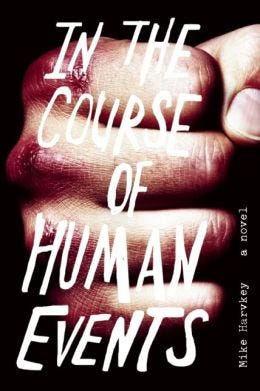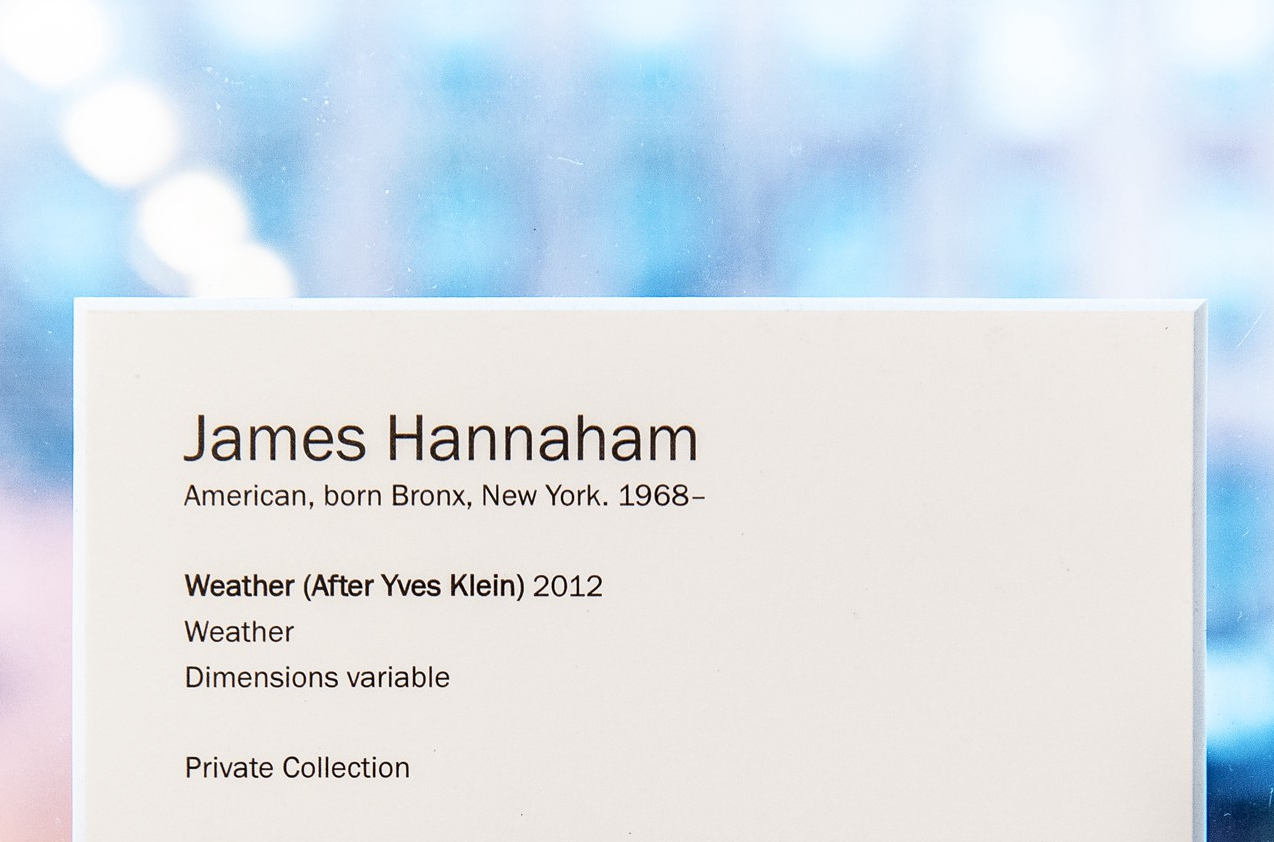Books & Culture
REVIEW: In the Course of Human Events by Mike Harvkey

by Benjamin Rybeck

“We be okay. This be America, man.”
This dialogue arrives 259 pages into Mike Harvkey’s In the Course of Human Events, and it’s the first time in the novel that anyone expresses any faith whatsoever in the United States. Granted, the minor character that speaks these words does so ironically: as an illegal immigrant, he has little reason to feel optimistic about his adopted country’s plans for him (especially since he utters this line of dialogue in a conversation about dealing crystal meth). But it’s at least a step beyond the novel’s earlier pages, which describe the setting — a small Missouri town — as “the town the American Dream forgot.”
Certainly the American Dream seems to have forgotten the novel’s protagonist, Clyde Twitty.
The factory where he used to work has closed. He makes a pittance occasionally driving cars to auctions. Later he gets a part-time job at Walmart, but it’s not enough, and he wonders, “How did this math make sense to anybody? Prices kept going up when the salary went down…” He’s past due on his mortgage and owes the government money from a years-old tax mistake (not his fault). Clyde seems so put-upon (or beaten “down in ways he didn’t even know,” as Harvkey’s third-person narrator reveals in a rare moment of psychic distance) that he seems much older than twenty, but he also has no expectation that his life will change. Instead, he looks at his economic circumstances, the result of a vast network of problems, and he boils it down to one sarcastic remark: “Thank you, Obama.”
Into Clyde’s life comes the Smalls family, which lives in a model house on otherwise undeveloped land. Tina, the family’s daughter, takes a special interest in Clyde: a budding entrepreneur, she first tries to pitch Clyde shampoo, and later tries to pitch herself as a girlfriend. (These scenes are farcical, with comic timing worthy of the Marx Brothers.) But it’s the family patriarch, Jay, in whom Clyde has the strongest interest. Jay teaches karate classes and invites Clyde to attend, drawing him into the family.
“Modern man is stuck in a rut,”
Jay tells him. “We been castrated. By society, by our wives, our mommies, our job.” Clyde is a young man full of misdirected rage, who feels like his masculinity is under assault from every direction. Before meeting Jay, Clyde never had anyone tell him that he’s worth a damn. “No one had ever seen into [Clyde] so clearly before,” Harvkey writes, and Clyde is seduced, so much so that he doesn’t worry much about Jay’s racist rants, or his assault weapons, or his paranoia about the FBI, or the book he reveres — The Turner Diaries, by William Luther Pierce (as Andrew Macdonald), which has counted Timothy McVeigh among its biggest fans.
In the Course of Human Events is a novel written out of anger
— anger that’s as far-reaching, though not as misdirected, as Clyde’s. Harvkey indicts a vast array of anti-government people: not only birthers and Tea Party-ers, but also men like Clive Bundy, or Alex Jones, who believe that grazing fees, or mandatory background checks for firearm purchases, are examples of governmental overreach. For Harvkey, Jay Smalls — assembling a group of warriors, fearful that President Obama and the federal government are advocating an anti-white agenda — represents a bouquet of America’s pernicious elements.
But Harvkey directs his sharpest anger toward people like Clyde, whose weakness allows them to be drawn into violence. A creative writing workshop might ask Harvkey, “Where’s the humanity in Clyde?” As a reader, it’s sometimes difficult to stomach a writer exploring despicable characters. But Harvkey finds plenty of complexity in Clyde as he traces his character’s descent into extremism, and this effort — making us understand Clyde — is the utility (to the degree that novels should be discussed in terms of “utility”) of this book. In telling Clyde’s story,
Harvkey humanizes a particular strand of extremism in American society.
But this doesn’t mean that Harvkey has to put a happy face on what he reveals. Harvkey does not find any humanity because there’s no humanity to find.
As a writer, Harvkey gets a lot of mileage out of simplicity. The novel opens with a sentence that echoes the plainspoken mistrust of the comma evinced by writers like Cormac McCarthy, Kent Haruf, and Joan Chase; elsewhere, Harvkey shows a willingness to indulge in Clyde’s vernacular, even when in third person, using terms like “pitching shit fits.” Harvkey is at his most manipulative in those moments as a writer, sucking the reader into a begrudging camaraderie with Clyde (it’s not hard to imagine a reader even agreeing with him during some early passages, where he criticizes bankers and CEOs for contributing to mass poverty) only to then push the character into psychologically disturbing places. Harvkey suggests this shift in subtle, syntactical ways. Here’s Harvkey writing a scene in which Clyde defends Jay against somebody outside of the Smalls family: “Clyde said, ‘[It has] nothing to do with [Jay],” even though it had everything to do with him. Everything.” In that last fragment — “Everything” — Harvkey tells an entire story about mind control, and the degree to which the influence of Jay has fractured and made repetitive Clyde’s thought patterns. Harvkey has other ways of suggesting Clyde’s psychological deterioration — notably, Clyde’s physical appearance gradually shifts, which evokes Travis Bickle — but
<em>In the Course of Human Events</em> is a sharp study in free indirect discourse.
By the novel’s end, Clyde is so disconnected from his own thoughts and his own body that Harvkey gets away with writing a loopy passage like this: “[Clyde] wanted to say, ‘Get your damn roscoe out of my face, pig,’ but didn’t. Then he did, he actually said it…”
In this great novel’s final stretch, there is a shootout — something of a cross between Llewelyn Moss vs. Anton Chigurh in No Country for Old Men and the end of Truffaut’s Shoot the Piano Player, but with a Fulci-like sense of gore — which, at first, seems designed to tie off the novel’s loose ends. But the novel closes in the middle of a scene, and the reader might feel frustrated to find that there isn’t another chapter — just the lingering knowledge of the violence and havoc that one character sill intends to cause. This plays into what makes In the Course of Human Events such a uniquely frightening novel: It seems almost to happen in real time, right in front of the reader’s eyes. It feels as contemporary as news read on a Twitter feed, with the kind of ending that makes a reader want to hit “refresh” again and again, hoping that something will change.

by Mike Harvkey










